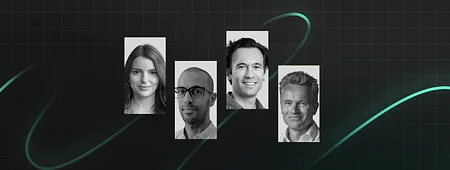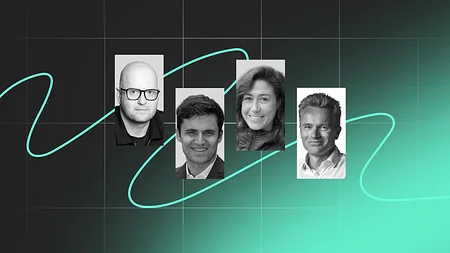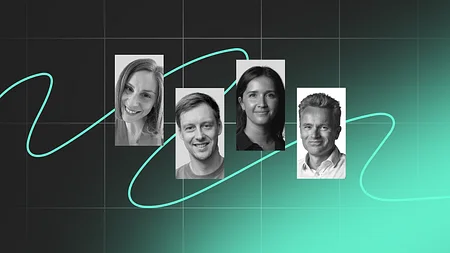Small team delivery and Snoop Dogg: Our interview with Michael Rouse, CCO of Klarna

Taste your product, be big and fast, invest in your own teams and partner with Snoop Dogg. Chief Commercial Officer of Klarna, Michael Rouse has more than a few nuggets of wisdom to share.
Walking into the room with an easy smile it’s not hard to see why Michael Rouse, CCO of Klarna has managed to move from dyed in the wool incumbent services to fintech without trouble. Sure, at 14 years old Klarna is almost every other fintech’s big brother, but the startup mentality and laser focus are clear.
After seven years at American Express, Michael moved to Klarna nearly four years ago. Leaving the mammoth financial services company in favour of the teenage fintech, which operates in e-commerce point of sale financing.
It’s a series of startups with 3000 people working in 300 teams
Michael Rouse, CCO of Klarna
Klarna is currently active across 18 geographies, 140,000 merchants and interacting with 60M customers. It’s impressive reach, especially when the focus is so niche.
Klarna was derided as solely a Nordics phenomenon, destined to never work outside of that area, even by Michael himself. But, much like The Girl with the Dragon Tattoo, it’s proved to be a far-reaching hit. Succeeding despite Michael’s own reservations that Klarna would ever survive outside of the Nordics, it has found huge success in the UK, US and in particular, Germany.
Part of that success is due to an agile mindset and practice, Klarna has approximately 3000 people working in 300 teams. And that doesn’t mean 10 person teams. They vary considerably in number with some having as few as two or three members.
If you can be big and fast it’s a powerful place to be
Teams at Klarna are driven by startup mentality. Rather than operating as a behemoth, Klarna chooses to operate as a series of startups - each one hyper-focused on solving a single problem. By using its unique structure to the fullest, Klarna manages to be as agile as a conventional startup while retaining the elephantine power of bigger players.
That doesn’t mean Klarna can’t still point the entire company to rapidly get a new product to market, in a timeframe that’d rival any software company. It recently conceptualised a product on a Tuesday and launched it four weeks later. As Michael says: “That’s the speed of what you can do when you put 2000 engineers onto a problem.”
There are resource issues, true. But it also allows the management layer of the company to act as a quasi-VC firm. Choosing where to invest and stimulate growth depending on the results or promise shown by any particular team.
Each team is led by an employee who’s empowered to be a business leader in their own right. All working towards the same goal but in very different ways, Michael makes it clear that changing the way people feel about payments is at the core of Klarna’s ethos. And part of that is smoooth payments.
The last thing any incumbent bank would do is partner with a brand and a phenomenon like Snoop
It’s a goal that’s been helped through the partnership with Snoop Dogg. Not necessarily a natural partnership in finance and certainly not one that would have been made at the larger financial services firms. Even if it has netted Michael quite a few new friends he didn’t know he had. That’s part of Klarna’s charm; taking risks because it’s a fintech that doesn’t have to answer to an oversaturated profit pool works in its favour.
Shareholders are a sticking point for Michael. Having come from a large financial services firm he’s seen first hand how they can stifle innovation and change, not out of malice, but from fear of rocking the boat for the length of an unconventional project. The profit pool of those large firms is too important to too many for anyone to put at risk for that long. In the end, it isn’t a lack of ideas in the incumbents. It’s a lack of conviction.
That’s before you examine the approvals process in an incumbent service. You need to wait months for a meeting, then convince everyone it’s a good idea, then once that’s finally done the hard work starts. That’s assuming you’re lucky and there’s only one meeting to convince everyone who needs to give approval. At that point, the project has to work out perfectly because it’s taken so much time and resource already just to get off the ground.
For Klarna, decision-making in business isn’t about making five perfect decisions, it’s making 10 or 20 quickly and having seven of them work out. The company that makes five perfect decisions doesn’t exist. Any company that only makes five decisions will likely only have a couple work out, if that.
It’s why you can tell a bank is in real trouble if it has to hire a Chief Digital Officer, as Michael puts it; hiring an outsider means that bank is admitting it can’t solve its internal problems.
There are plenty of great CDOs out there, but when a bank’s spiralling, employing someone from the outside to sit across the entire issue with no real mandate sends a poor message. Especially when that person’s job is invariably to convince people in the business to do what they should already be doing.
We used to taste the product, that’s how you could tell if it was good or bad
Before working in financial services Michael worked in the biscuits industry. Biscuits are a lot easier to get your teeth into than a digital product, but the principle remains the same. Trying your own product is vital to understanding what customers experience, what part of the journey they’ll enjoy and what they won’t. Bite into your product and see if it’s any good.
One of Klarna’s goals is to make sure it’s never a traditional blue and white bank or payments company. It’s safe to say there’s little chance of that happening any time soon.
Listen to the entire interview on the Fintech Insiders podcast.


